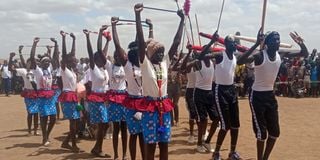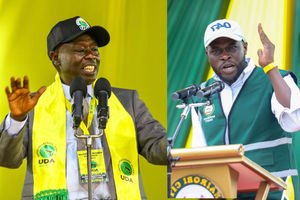Unesco recognises first refugee-led cultural festival at Kakuma

Boys and girls from South Sudan entertaining visitors at the Kakuma Sound festival on July 17, 2022.
The United Nations cultural agency Unesco has recognised the first refugee-led cultural festival to be held at the Kakuma camp in Turkana County.
This follows a successful Kakuma Sound festival held on July 16- 17 that sought to foster a sense of belonging, inclusion, resilience and peaceful coexistence among more than 190,000 from over 30 refugee communities and the host Turkana community.
"The UN's cultural agency in partnership with Kakuma Sound underscores our ambition to further promote the role and contribution of culture as an enabler for sustainable development while making sure we Leave No One Behind," said Unesco Eastern Africa culture officer Judith Ogana in a statement.
Universal Declaration of Human Rights
Ms Ogana said the festival was in line with Article 27 of the Universal Declaration of Human Rights, which holds that “Everyone has the right freely to participate in the cultural life of the community, to enjoy the arts and to share in scientific advancement and its benefits”.
The event, characterised by pomp and colour, attracted hundreds of refugees and Turkana County residents who sought to showcase the traditions and cultural practices.
There were unique displays of traditional musical instruments, dances, regalia, crafts and foods, with passionate performers braving the scorching sun and occasional winds to participate.

Dancers and drummers stage a performance at Kakuma Sound Cultural Festival on July 17, 2022.
Youthful performers
One striking aspect of the festival was that most performers were young people below the age of 30, most of whom, until three years ago, had not touched a traditional instrument from their culture since they were born, organisers said.
The Unity State Bentiu (USB) Nuer group, with 40 members, was among the 30 groups that entertained guests with their song “Nuer Ee Raan”, which vividly preached unity among the sub-tribes of the Nuer community of South Sudan.
Mr Michael Tuar Juch, USB Group chairman, said they didn't choose to live at Kakuma or be born there but they are there because of conflict and war.
"Now that Kakuma is currently our home we are banking on cementing unity first within our Nuer community through celebrating our culture and traditions and extending to our countrymen from the Dinka community and other nationalities," Mr Juch said.
Born in the camp
He acknowledged that some of the teenagers in the group born in the camp were not in touch with the history and culture of their countries of origin, especially musical instruments, songs, food and dances.
"We always have training and rehearsal during free time where children get time to play with the instruments, bonding well with the culture where the drummers transfer skills through actively playing together so that they are not rendered idle and left to indulge in wasteful alcohol and drug abuse," he explained.
All the performances easily blended with the main theme of integration, love and unity, and were appreciated by the excited crowd that waved the flags of the performing nationalities to show solidarity.
Veteran Afro-fusion artiste
Mr Eric Wainaina, a veteran Kenyan Afro-fusion artiste, attended the festival and was thrilled by the huge turnout and passion of the youthful performers.
Refugees were proud of the culture and traditions of their motherlands, he said, but what they lacked was a platform like the cultural festival and more support to inspire more to form such groups.
"It is evident that refugees have developed courage to do anything that can unite them and if they can come together through music, they would be [respected] in the world because they are rich in indigenous musical instruments, especially drums, and we can arguably count on them for the direction of Africa music," he said.
Earn from performances
Besides preserving and promoting traditional musical heritage, he added, the refugees and host community will be empowered to earn from their performances.
For Ms Nyamal Fida, from South Sudan, and Ms Regina Nanok, a Kenyan, the festival provided a marketing platform for their locally made products that included beaded bags, earrings and bracelets.
"We were challenged that each community or nationality can buy our products, each has unique colours and designs," Ms Nanok said.

Kakuma Sound Co Founders Trey Tumwa (left) and Mark Levine monitoring the Cultural festival on July 17, 2022.
Mr Treynor Tumwa, co-founder Kakuma Sound, said they realised that it had been 30 years since the Kakuma refugee camp was established and a majority of the young people there of South Sudanese origin were either born there or came when they were young with little knowledge about their culture.
"An idea was conceived with the objective of having a traditional sound that all the more than 20 nationalities that include Burundi, South Sudan, Ethiopia, DRC Congo, Rwanda and Somalia could relate to as their anthem," Mr Tumwa said.
Fruitful initiative
They first prioritised buying musical equipment for specific communities and later flew in trainers well versed with the cultures and music of the communities to introduce refugees to the equipment as they taught them how to play and compose songs.
The initiative bore fruit, as through the cultural festival, refugees passionately showcased their diverse culture and traditions.
"Kakuma Sound will create the camp to be a museum of indigenous culture from the various nationalities where tourists can be easily convinced to visit," Mr Tumwa said.
Trained musicians
Mr Mark Levine, another Kakuma Sound co-founder, observed that it was during the Covid-19 period that they procured musical instruments for different groups in the refugee camp and trained musicians with support from partners.
"We realised it was a very unique idea to bring all the cultures within the refugee camp together to create traditional music,” Mr Levine said.
“In partnership with Unesco and UNHCR, we want to ensure all refugee camps in the world have access to traditional musical instruments so that they are in touch with their traditional music and culture."
The second edition of the Kakuma Sound cultural festival will be held at the end of this year. It will seek to expand inter-agency and institutional collaboration to promote the role of music and dance in creating a positive narrative about the Kakuma refugee camp.





